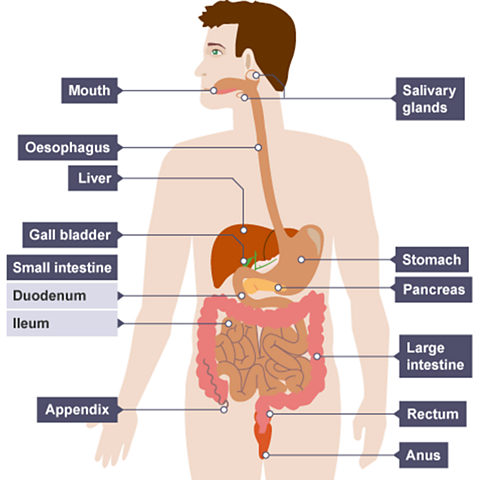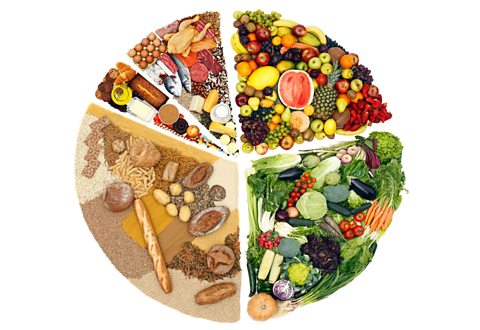Burping, belching or eructation (the medical name for burping) – whatever you know it as, is a normal bodily function. But what is burping? Why do we it? and what causes us to burp? At Bitesize, we're gassed to tell you.
What is burping?
A burp is the body’s way of releasing excess air from the oesophagus or stomach, out through the mouth. Burping is an important function that allows the body to remove unwanted air from the upper digestive tract. Whilst burping may be funny to some, you don't need to feel embarrassed by it - it's a normal part of the human digestive system!
Humans aren't the only mammals that burp, it is also common among other mammals such as cows, sheep and even dogs! Whilst we remove some of the excess gas through belching, some of the gas passes into our intestines. The intestinal gas eventually comes out as flatulence, also known as farting.
Did you know - According to the Guinness World Records, the longest burp ever recorded was a whopping 1 minute 13 seconds long - talk about a big burp!
How do people burp?

Let's look at the science behind burping when we digest food.
When a person swallows, the cricopharyngeus muscle relaxes. This allows food and drink to pass into the oesophagusThe tube that carries food from your mouth to your stomach. It is a part of the digestive system.. Once a person has swallowed, the muscle then constricts and closes the top of the oesophagus.
The oesophageal sphincter (a valve that acts like a barrier and either keeps gas in or releases it), opens. This allows food to travel down the oesophagus and into the stomach. Here the food begins to be broken down. The chemicals in the food then react with the chemicals in the stomach, which can cause gas to build enzymes. The chemicals in the food then react with the chemicals in the stomach, which can cause gas to build.
As this gas builds, this can cause the urge to burp. When there is too much gas, the sphincter at the top of the oesophagus opens and the gas escapes. As the burp comes out, the soft tissue at the top of the oesophagus flaps- that's what causes the sound!
Remember, whilst burping is completely normal, it can be seen as bad mannered and so it is always polite to say “excuse me” after belching.
Did you know – the world’s loudest burp was performed by Neville Sharp on 29th July 2021, recorded at 112.4db.

What are some of the causes of burping?
We now know that too much air in the digestive tract causes burping, but there are lots of factors that can contribute to this. Let's explore some below.
1. Eating and drinking quickly
Burping a lot after eating? A common cause of burping is from swallowing air, specifically oxygen and nitrogen, when eating and drinking quickly. To help, try taking your time when consuming food and drink as this can help you swallow less air. However, belching after food and drink is often nothing to worry about and can help relieve bloating.
2. Drinking carbonated beverages
Carbonated beverages such as fizzy drinks, contain dissolved carbon dioxide. When you drink them, the air bubbles go into the stomach, causing it to build up. In this instance, when you burp, the expelled gas is mainly the carbon dioxide from the drink. If you're burping a lot after drinking fizzy drinks, try reducing how often you have them.

3. A symptom of medical conditions
Symptoms such as passing gas, belching and bloating can resolve on their own and are normal bodily functions. If you are burping a lot with no other symptoms, it is unlikely that this is being caused by a medical condition.
People who suffer from medical conditions such as irritable bowel syndrome (IBS), gastroesophageal reflux disease (GERD) or indigestion may burp excessively as a symptom, but these conditions often feature a range of other symptoms that will lead to a medical diagnosis by a doctor. Whilst burping is often nothing to worry about, if you are worried, you should check it with a doctor.
4. Eating too many foods that are high in fibre or fat

Common belch-inducing offenders include eating too many high-fibre foods such as beans, lentils and products that contain wheat.
Fibre is vital for gut health as it helps the digestive system move food through the intestines and push the waste material out of the body. However, eating too much high-fibre food can produce more gas in the stomach through chemical reactions which can be uncomfortable and cause bloating.
Foods with high-fat content can also cause gas, as too much fat slows digestion, giving food more time to ferment. Reducing your intake of these foods may help to reduce the amount you burp.
Remember, it is still important to eat a balanced diet to ensure your body gets all the essential nutrients it needs.

5. Prolonged sitting after a meal
Sitting for long periods of time after a meal can slow down digestion. This is because food moves through the stomach more slowly than when you are standing. Whilst you may feel fuller for longer, you may also burp more. To help reduce burping you could try increasing your movement or taking a short walk once you have finished eating.
What would happen if we didn't burp?
If we don’t burp, gas builds up in the stomach which can cause a lot of discomfort, bloating and flatulence. Whilst burping is normal, some people have RCD (aka no burp syndrome), a medical condition that means they are unable to burp.
This occurs when the cricopharyngeal muscle in the throat is unable to relax to allow gas to pass up and out of the body. Although a rare condition, doctors are able to help treat this condition with Botox injections. Botox is injected into the cricopharyngeal muscle, allowing it to relax and the air to be released.